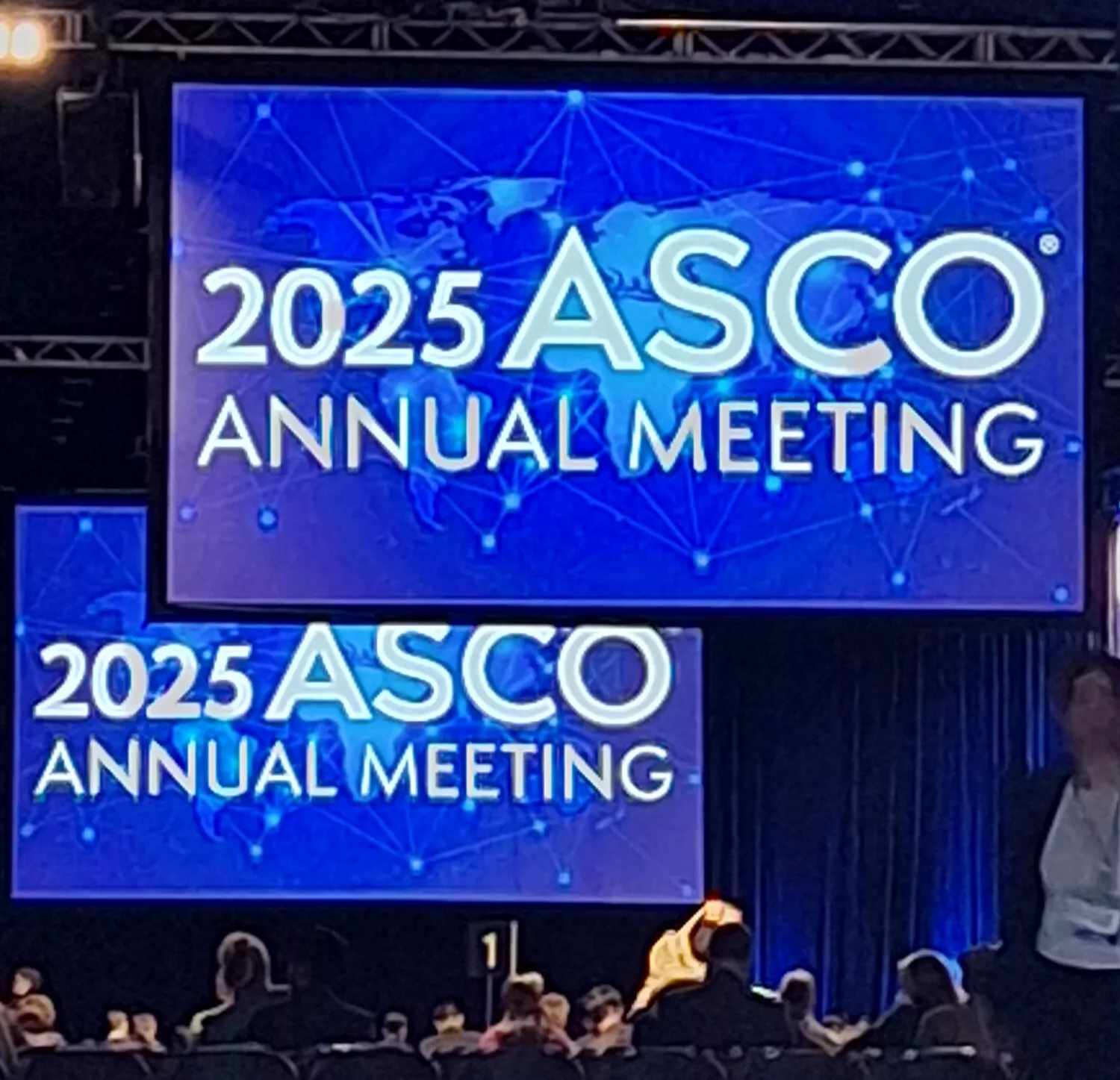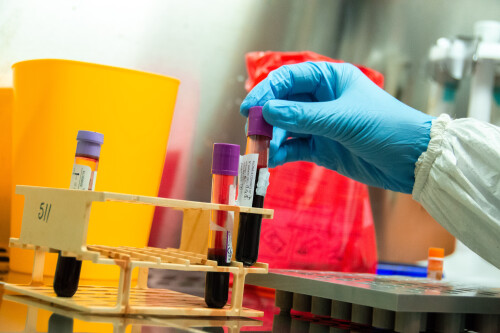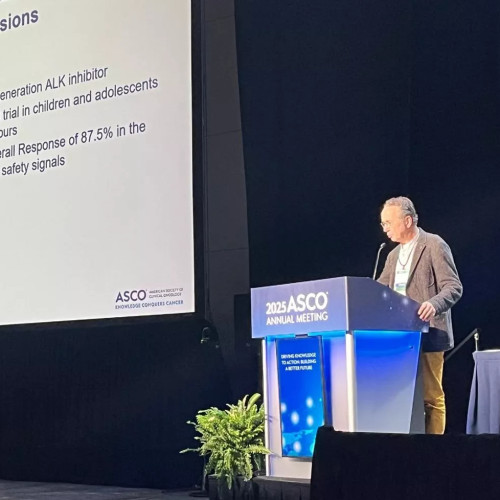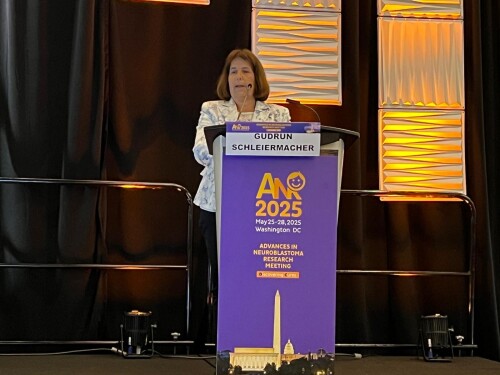Prof. Steven Le Gouill, director of the Hospital Group at Institut Curie: "Circulating biomarkers, therapeutic vaccines, new anti-tumor molecules... the 2025 edition of ASCO promises to be particularly rich for Institut Curie, with presentations covering many types of cancer. This strong mobilization illustrates the commitment of the Institute's physicians and researchers, who work in synergy on innovative projects. These promising prospects reinforce our commitment to fighting cancer and our determination to transform clinical research into concrete sources of hope for patients."
Women's cancer > Results of the SERENA-6 phase 3 study in hormone-dependent metastatic breast cancer: a pioneering approach to intercepting treatment resistance using liquid biopsies => Press release on June 1 > An ultra-sensitive, personalized test for detecting circulating tumor DNA to improve the management of triple-negative breast cancer > Radiology for therapeutic de-escalation in triple-negative breast cancer > Ovarian cancer: towards increasingly personalized medicine > HER2+ metastatic breast cancer: real-world data from a triple therapy regimen as a third-line treatment
Therapeutic vaccines against cancer > Promising results for the world's first individualized vaccine for ENT diseases > Vaccine therapy in metastatic pancreatic cancer > Combining immunotherapy with a therapeutic vaccine against papillomavirus
Pediatric cancers > New targeted therapy shows excellent efficacy in very rare pediatric cancers => Press release on May 31
Thoracic cancers > Lung cancer: a new treatment improves patient survival => Press release on June 2 > Thymus cancer: a European collaborative research effort > New molecular markers specific to metastatic lung cancers
|
Women's cancer
The research and clinical trials conducted by Institut Curie teams in the field of women's cancers are part of the momentum of the new University Hospital Institute (IHU) Institute for Women's Cancers, jointly supported by Institut Curie, Inserm, and PSL, which will be launched in June 2024.
Results of the SERENA-6 phase 3 study in hormone-dependent metastatic breast cancer: a pioneering approach to intercepting treatment resistance using liquid biopsies
In nearly 40% of hormone-dependent metastatic breast cancers, resistance to treatment occurs following the appearance of a mutation in the estrogen receptor (ESR1), which can be detected in the blood. Can this resistance be identified through repeated liquid biopsies before the cancer starts growing again? If so, could it be intercepted and countered by modifying hormone therapy to improve patient outcomes? The first proof of concept was published in 2022 with the pioneering French PADA-1 trial, designed by Prof. François-Clément Bidard, medical oncologist at Institut Curie and international expert in liquid biopsies. SERENA-6 is the first global registration trial following the path explored by PADA-1. It demonstrates the value of a new hormone therapy (camizestrant/AstraZeneca) targeting these mutations as soon as they appear, with the goal of delaying tumor progression and preserving patients' quality of life for as long as possible. This new study, co-led globally by Prof. Bidard, will be presented in a plenary session, highlighting the significance of this approach, which could mark a major advance in the treatment of metastatic cancers—potentially beyond breast cancer.
Camizestrant + CDK4/6 inhibitor (CDK4/6i) for the treatment of emergent ESR1 mutations during first line (1L) endocrine-based therapy (ET), ahead of disease progression in patients with HR+/HER2– advanced breast cancer (ABC): Phase 3, double-blind, ctDNA-guided SERENA-6 trial, plenary session, June 1, 2025. Prof. François-Clément Bidard, last author of the presentation & first author of the publication. => PRESS RELEASE TO FOLLOW JUNE 1.
An ultra-sensitive, personalized circulating tumor DNA test to improve the management of triple-negative breast cancer
Triple-negative breast cancers represent approximately 15% of breast cancer cases. They affect younger women more frequently and remain particularly difficult to treat. In early-stage disease, patients receive neoadjuvant therapy (before surgery) combining chemotherapy and, in high-risk cases, immunotherapy. The decision to administer post-surgery chemotherapy depends on whether a complete pathological response is achieved. However, this response only assesses local disease and does not reveal the presence of distant micrometastases.
As part of a collaboration with Personalis, teams at Institut Curie evaluated a highly sensitive circulating tumor DNA test for triple-negative breast cancer during neoadjuvant treatment. Based on whole-genome sequencing of the tumor, the test generates a unique panel for each patient, analyzing up to 1,800 variants—far more than the 10 to 50 variants screened by conventional methods. Patients who test positive for ctDNA after chemotherapy face a high risk of relapse, while those testing negative have an excellent prognosis. Conducted at Institut Curie (Scandare cohort), the study shows that this ultra-sensitive ctDNA test more accurately predicts relapse risk in patients without complete histological response. These findings suggest potential for clinical implementation, possibly enabling treatment de-escalation in selected patients.
Ultrasensitive circulating tumor DNA (ctDNA) detection for prognostication in triple-negative breast cancer (TNBC) post-neoadjuvant chemotherapy (NAC). Dr. Luc Cabel, Prof. Christophe Le Tourneau, Prof. François-Clément Bidard. Poster session, June 2
Radiology for therapeutic de-escalation in triple-negative breast cancer
Can a breast MRI performed after neoadjuvant treatment reliably indicate the absence of cancer cells in patients with triple-negative breast cancer? To answer this, a study led by Institut Curie and two other French centers evaluated 259 patients with early-stage TNBC. Physicians compared MRI findings with pathology results from surgery. MRI alone correctly identified the absence of cancer in 83% of cases. When combined with two additional factors (absence of lymph node involvement and a low Ki-67 proliferation index), accuracy increased to 88%. Even when a residual abnormality was visible, AI-enhanced image analysis (radiomics) further improved accuracy. These results suggest that high-precision MRI after treatment could one day help safely identify patients who could avoid breast and lymph node surgery, significantly reducing side effects and preserving quality of life. This would represent a major advance, particularly in reducing side effects and preserving the quality of life of affected women.
Post-treatment MRI to predict pathological complete response in triple-negative breast cancer following neoadjuvant chemoimmunotherapy – Poster session, 2 juin 2025, Dr. Toulsie Ramtohul
Ovarian cancer: toward increasingly personalized medicine
Ovarian cancer affects over 5,000 women in France each year, with an average age of around 65. The standard first-line treatment involves surgery and chemotherapy. Since the publication of the PAOLA-1 Phase 3 trial results, standard care has been enhanced with the addition of a PARP inhibitor (olaparib), a targeted therapy that disrupts the DNA repair mechanisms in cancer cells. This treatment is particularly effective in patients with BRCA mutations. For other women, oncologists worldwide routinely perform an HRD (Homologous Recombination Deficiency) test to assess the extent of genomic rearrangements and breaks in tumor DNA.
The results are expressed as a Genomic Instability Score (GIS). A score below 42 is considered negative and does not justify a PARP inhibitor, while a score above 42 is positive. But is a score close to 42 equivalent to one near 60? A new study, led by Institut Curie in collaboration with Geneva University Hospitals and promoted by the ARCAGY-GINECO cooperative group, is the first to analyze GIS thresholds in depth. The research introduces a refined classification of three patient groups—low, intermediate, and high—based on the degree of benefit observed. These findings could inform future clinical trials involving PARP inhibitors and contribute to a deeper understanding of the mechanisms driving carcinogenesis in each subgroup.
Genomic instability score (GIS) and benefit from olaparib (ola) and bevacizumab (bev) maintenance in high-grade ovarian cancer (HGOC): Phase III PAOLA-1 GINECO/ENGOT-ov25 trial exploratory analysis. Poster session, June 1, Dr. Manuel Rodrigues
Breast cancer Metastatic HER2+ breast cancer: real-world dataon a triple therapy used in later treatment lines
Breast cancers HER2-positive breast cancers account for around 15% of cases and are defined by overexpression of the HER2 receptor, a growth factor involved in cell proliferation. A French multicenter retrospective study evaluated the real-world effectiveness of a triple combination therapy—tucatinib, trastuzumab, and capecitabine (TTC)—in patients with HER2-positive metastatic breast cancer who had previously received trastuzumab-deruxtecan. This treatment sequence had not yet been evaluated in this context. TTC combines: Tucatinib, a HER2-targeted tyrosine kinase inhibitor, Trastuzumab, an antibody targeting HER2 receptors, and Capecitabine, an oral chemotherapy. Institut Curie played a key role in this retrospective study, which was coordinated by the Institut de Cancérologie de l'Ouest. Conducted in 101 patients with a median follow-up of 30 months, the study reports real-world data on both progression-free survival and overall survival. The results support current recommendations for managing HER2+ metastatic breast cancer: TTC remains effective even after trastuzumab-deruxtecan, validating it as a viable additional therapeutic option.
Efficacy of tucatinib, trastuzumab, and capecitabine (TTC) following trastuzumab-deruxtecan (T-DXd) in HER2-positive metastatic breast cancer (MBC): Updated results and subgroup analyses from the UNICANCER multicenter retrospective cohort. Poster session, June 2, 2025, Dr. Delphine Loirat
Therapeutic vaccines
Promising results for the world's first personalized vaccine for ENT cancers
Even after surgery and intensive treatments, ENT (ear, nose, and throat) cancers carry a high risk of recurrence—between 20% and 30%. Could personalized vaccination help prevent these relapses? Prof. Christophe Le Tourneau, medical oncologist, head of the Early Clinical Trials Department at Institut Curie, and head of ENT oncology, will present the results of a randomized Phase 1 study evaluating the effect of an innovative vaccine (TG4050), developed in collaboration with Transgene, in patients with ENT cancers. This personalized vaccine is tailored to each patient: using sequencing data from their tumor cells, scientists identify approximately 30 specific mutations and use artificial intelligence to develop a vaccine unique to that individual.
Patients were randomized to receive either TG4050 monotherapy or no vaccine at that stage. In total, 33 patients in remission following radio(chemo)therapy were enrolled. The results show TG4050 is safe and generates sustained immune responses. Remarkably, none of the vaccinated patients relapsed, whereas nearly 20% of patients in the control group did—a statistically significant improvement in recurrence-free survival. “These results suggest TG4050 could significantly reduce relapse risk in patients who have undergone surgery for ENT cancers,” said Prof. Le Tourneau. Larger trials are underway to confirm these findings. “The clinical landscape for ENT cancers is evolving rapidly. Individualized therapeutic vaccines offer real hope for these patients, and we are excited to move forward with this highly innovative approach.”
Randomized phase I trial of adjuvant personalized cancer vaccine TG4050 in resected locally advanced (LA) head and neck squamous cell carcinoma (HNSCC) patients (pts). Rapid oral session, June 1. Prof. Christophe Le Tourneau
Vaccine therapy in metastatic pancreatic cancer
With roughly 16,000 new cases annually in France, pancreatic cancer is typically diagnosed at an advanced stage and demands new, effective treatment strategies. Among the promising avenues explored at Institut Curie are immune-modulating vaccines, particularly those based on the “dark genome.” The randomized Phase 2 clinical trial PRODIGE TEDOPaM, promoted by the academic cooperative group GERCOR, evaluated the efficacy and safety of the therapeutic vaccine OSE2101 (developed by OSE Immunotherapeutics) in combination with maintenance chemotherapy in first-line metastatic pancreatic cancer. OSE2101 targets five tumor-associated antigens and is a differentiated, off-the-shelf immunotherapy designed to activate tumor-specific T cells.
Prof. Cindy Neuzillet, gastroenterologist and head of the Digestive Oncology Department at Institut Curie, will present the trial results. The PRODIGE TEDOPaM study, which enrolled 106 patients, achieved its primary endpoint—showing positive outcomes in the experimental arm (vaccine + chemotherapy) with minimal toxicity. Further analysis, including tumor tissue, blood, and imaging data from the ancillary IMMUNOPanc-Sign program, ordered by Prof. Neuzillet, is ongoing to better understand treatment effects. Long-term follow-up will provide more mature survival data. “These findings are encouraging for a non-comparative trial,” said Prof. Neuzillet. “It's crucial to clarify the role of OSE2101 in this therapeutic combination so we can better identify patients who may benefit and continue developing new treatment options for pancreatic cancer.”
Maintenance with OSE2101 plus FOLFIRI vs FOLFIRI alone after FOLFIRINOX (FFX) induction in patients (Pts) with advanced pancreatic ductal adenocarcinoma (aPDAC): Primary endpoint results of a randomized TEDOPAM GERCOR D17-01 PRODIGE 63 trial. Clinical Science Symposium, June 2, 2025. Prof. Cindy Neuzillet
Combining immunotherapy with a therapeutic vaccine against papillomavirus
Human papillomavirus (HPV)-related cancers account for about 4.5% of all cancers globally, with incidence rates varying widely by region. HPV16 is the most common cancer-causing strain and can lead to tumors in multiple areas of the body. Professor Christophe Le Tourneau's team at Institut Curie conducted a randomized phase 2 trial evaluating the combination of TG4001, a therapeutic vaccine against HPV16 developed by Transgene, and immunotherapy (avelumab) in patients with recurrent cervical, anogenital, or other HPV16-positive genital cancers. Ninety patients participated. While the combination did not improve progression-free survival over immunotherapy alone in the overall cohort, a planned subgroup analysis in cervical cancer revealed a positive signal of efficacy for those who received the vaccine. Prof. Le Tourneau and his team are now focusing on developing therapeutic HPV vaccines for earlier disease stages—an approach that appears more promising, as illustrated by the success of TG4050 in ENT cancers.
Randomized phase II trial evaluating the combination of TG4001, an HPV16 therapeutic vaccine, and avelumab (ave) in patients (pts) with immunotherapy-naïve recurrent and/or metastatic (R/M) HPV16-positive cervical or anogenital cancer. Poster session, June 2. Prof. Christophe Le Tourneau
Pediatric cancers
New targeted therapy shows excellent efficacy in very rare pediatric cancers
In children and adolescents, certain very rare tumors—often associated with a poor prognosis—are characterized by ALK gene fusions. This abnormality particularly affects high-grade pediatric gliomas, specific sarcomas, and inflammatory myofibroblastic tumors (which are not malignant but can be locally aggressive). Teams at Institut Curie are internationally recognized for their expertise on the ALK gene and its clinical implications.
ALK inhibitors have already been used in some childhood cancers, including anaplastic large cell lymphomas (with ALK fusions) and select cases of neuroblastomas (with ALK mutations or amplifications). Prof. François Doz, pediatric oncologist and deputy director of clinical research, innovation, and education at the SIREDO Center at Institut Curie, will present the encouraging results from the iMATRIX Phase 1/2 study, which evaluated alectinib in children with central nervous system (CNS) or non-lymphomatous solid tumors harboring ALK gene fusions.
“Alectinib in children and adolescents with solid or CNS tumors harboring ALK-fusions: A data update from the iMATRIX alectinib phase I/II open-label, multi-center study. Oral abstract session - Pediatric Oncology, 31 May, 2025. Prof. François Doz => DEDICTED PRESS RELEASE 31 MAY
Thoracic cancers
Lung cancer a new treatment improves patient survival
With 52,777 new cases in 2023, lung cancer is the third most common cancer in France, and its incidence is rapidly increasing among women. Many patients with non-small cell lung cancer (NSCLC)—the most prevalent form—can be cured by surgery if diagnosed before metastasis. However, 30% to 55% of these patients eventually experience a recurrence.
Since 2017, Institut Curie has coordinated the international CheckMate-816 Phase 3 study, which involved 358 patients with resectable NSCLC. The trial demonstrated that combining immunotherapy with chemotherapy before surgery reduced the risk of recurrence and death by nearly 40%. The final results on overall survival from this five-year study will be presented at ASCO 2025. The positive results, with a 40% reduction in recurrence, are accompanied by a real increase in overall survival, the results of which will be presented at the conference, confirming the clinical value of this new therapeutic strategy and offering hope for many patients," said Prof. Nicolas Girard, pulmonologist, head of the Medical Oncology Department at Institut Curie and coordinator of the CheckMate-816 study.
Overall survival with neoadjuvant nivolumab (NIVO) + chemotherapy (chemo) in patients with resectable NSCLC in CheckMate 816. Oral abstract session, 2 juin 2025. Prof. Nicolas Girard Last author
=> Press release to follow on June 2, 2025
Thymus cancer: a collaborative European research effort
Thymus cancers—arising in a central organ of the immune system—are rare, affecting about 250 people annually in France. These tumors can be particularly aggressive and often recur. When first-line treatments fail, especially in advanced or metastatic cases, no standard effective therapy exists. Institut Curie, a national and European reference center for rare tumors, brings unique multidisciplinary expertise to thymus cancer care. In partnership with the European Organisation for Research and Treatment of Cancer (EORTC), the NIVOTHYM Phase 2 multicenter trial evaluated progression-free survival using a combination of nivolumab and ipilimumab (two immunotherapies) in patients with advanced thymus cancer. While the treatment showed limited efficacy, the study underscores the importance of investigating immunotherapy for thymic tumors. “The NIVOTHYM study demonstrates the strength of national and European networks in advancing rare cancer research,” said Prof. Nicolas Girard, pulmonologist, head of the medical oncology department at Institut Curie.
Efficacy and safety of nivolumab plus ipilimumab for patients with pre-treated type B3 thymoma and thymic carcinoma: Results from the EORTC-ETOP NIVOTHYM phase II trial. Rapid Oral Abstract Session, June 1, 2025. Prof. Nicolas GIRARD
New molecular markers specific to metastatic lung cancer
A team from Institut Curie conducted a comprehensive genomic analysis of 366 tumor samples from patients with advanced lung cancer, as part of the UNICANCER SAFIR02-Lung multicenter clinical trial. The goal was to evaluate the utility of high-throughput genomics in guiding treatment decisions. The study identified alterations specific to metastatic forms, including marked chromosomal instability and mutations in the KRAS and CDKN2A genes. These discoveries offer new insights into the mechanisms of tumor progression and could pave the way for more targeted, personalized treatments in metastatic lung cancer.
Molecular analysis of lung adenocarcinomas from the SAFIR02-Lung trial explores metastasis-associated alterations and potential prognostic markers. Poster session. May 31, 2025 Dr Abderaouf Hamza



